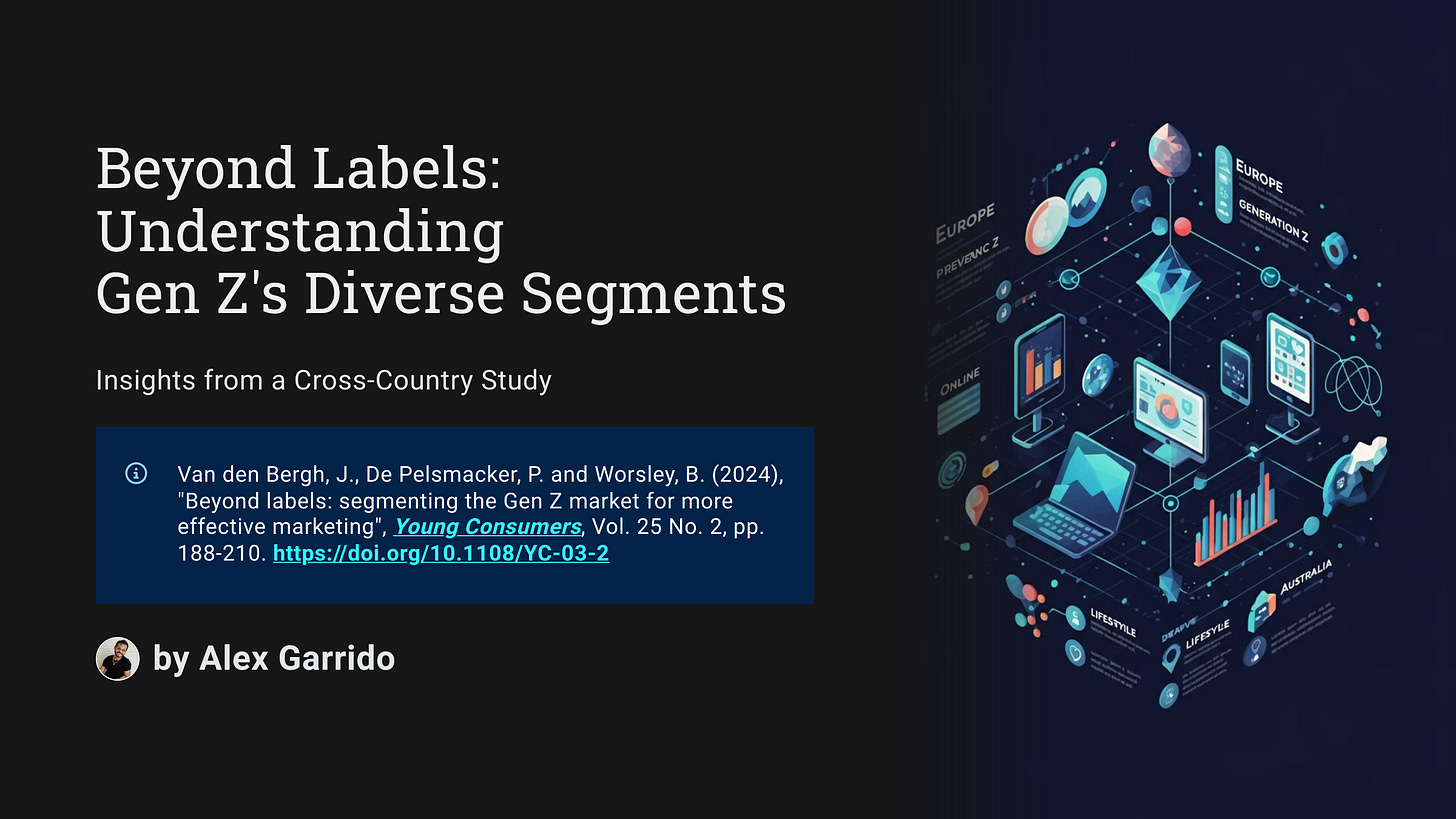Source:
Van den Bergh, J., De Pelsmacker, P. and Worsley, B. (2024), "Beyond labels: segmenting the Gen Z market for more effective marketing", Young Consumers, Vol. 25 No. 2, pp. 188-210. https://doi.org/10.1108/YC-03-2023-1707
In today's rapidly evolving marketing landscape, understanding your target audience is more crucial than ever. When it comes to Gen Z, the generation born between 1996 and 2010, marketers often fall into the trap of viewing them as a homogeneous group. However, recent research conducted across Europe, the USA, and Australia challenges this notion, revealing a rich tapestry of diverse segments within this cohort.
The Myth of the Monolithic Gen Z
For years, marketers have relied on broad generalizations about Gen Z:
Digital natives
Socially conscious
Value-driven consumers
Short attention spans
While these characteristics hold some truth, they fail to capture the nuanced reality of this generation. The groundbreaking study we're examining today, which surveyed over 4,000 Gen Z individuals, paints a far more complex picture.
Unveiling the Gen Z Segments
The research identified several distinct segments within Gen Z, each with its own unique set of values, preferences, and behaviors:
The Well-Off Show-Offs: This group, more prevalent in the US and Australia, values sustainable, high-quality brands with an air of exclusivity. They're willing to pay a premium for products that align with their ethical standards while also conveying status.
The Happy Hipsters: Similar to the Well-Off Show-Offs in their love for exclusive sustainable brands, this segment places a much higher emphasis on inclusivity. They seek brands that reflect their values across the board, from environmental concerns to social justice issues.
The Unwoke Geeks: Less concerned with sustainability or inclusivity, this group focuses more on traditional markers of success like money and status. However, they often struggle financially, leading to a sense of nostalgia and uncertainty about the future.
The Eco-Warriors: Deeply committed to sustainable choices and environmental concerns, this segment is wary of large corporations and prefers smaller, more transparent brands.
The Eco-Fatalists (unique to Europe): While they care about inclusivity and the environment, this group has a sense that it's almost too late to turn things around. This fatalism influences their behavior, making them very frugal and less concerned with material possessions.
Digital Habits and Preferences
The study also shed light on Gen Z's digital habits:
They value clarity and functionality in websites, preferring seamless, intuitive experiences over flashy designs.
Different social media platforms serve distinct purposes:
TikTok for short, engaging, trend-driven content
YouTube for deeper dives, tutorials, and educational content
Instagram for creative visuals and connecting with influencers
Interestingly, the research also highlighted the rise of virtual influencers among Gen Z, showcasing their comfort with digital personas and online identities.
Key Takeaways for Marketers
Recognize the diversity: Avoid one-size-fits-all approaches. Tailor your messaging and offerings to the specific Gen Z segment you're targeting.
Authenticity is key: Across all segments, Gen Z values genuine connections and transparency from brands.
Balance purpose and practicality: While many Gen Z consumers care about social and environmental issues, they're also dealing with economic uncertainties. Brands that can address both these aspects will resonate strongly.
Optimize for digital natives: Ensure your online presence is seamless, intuitive, and provides value across various platforms.
Stay adaptable: Gen Z's preferences and behaviors are still evolving. Continuous research and agility in your marketing strategies are essential.
The world of Gen Z marketing is far more nuanced than previously thought. By recognizing and respecting the diversity within this generation, brands can forge deeper, more meaningful connections with their Gen Z audience. As marketers, our challenge is to move beyond broad generalizations and truly understand the multifaceted nature of this influential cohort.













